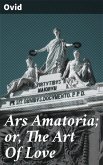Ovid's "Ars Amatoria; or, The Art of Love" is a provocative and playful exploration of romantic relationships, offering guidance on the art of seduction and the complexities of love in ancient Rome. This didactic poem is divided into three books, each laced with humor, wit, and vivid imagery. Through its innovative narrative voice and epistolary format, Ovid not only instructs his readers on the techniques of courtship and the rules of love but also critiques the societal norms surrounding relationships, revealing the tensions inherent in both desire and fidelity. The interplay of erudition and entertainment that characterizes Ovid's style positions this text within the rich tradition of elegiac poetry while challenging conventional moral expectations of his time. Publius Ovidius Naso, commonly known as Ovid, was a poet of remarkable versatility, whose experiences in both love and exile inform his literary output. Born in 43 BCE, Ovid's life was marked by both privilege and controversy, as he navigated the intricate social web of Rome's elite. His exile in 8 CE, a punishment meted out for reasons still debated by scholars, further underscored the tension between the poet's private experiences and public life, influencing his reflections on themes of love and transformation. "Ars Amatoria" remains a crucial text for those seeking insight into the art of love not just as an act of romance but as a cultural phenomenon. Readers fascinated by the rhythms of love, the intricacies of desire, or the philosophical musings on relationships will find this work a captivating and essential addition to their literary repertoire. Ovid's blend of sincerity and playfulness invites both scholarly analysis and personal reflection, making it a timeless guide to love's enduring challenges.
Dieser Download kann aus rechtlichen Gründen nur mit Rechnungsadresse in A, B, BG, CY, CZ, D, DK, EW, E, FIN, F, GR, H, IRL, I, LT, L, LR, M, NL, PL, P, R, S, SLO, SK ausgeliefert werden.









